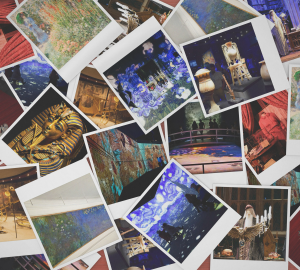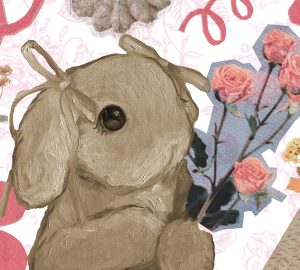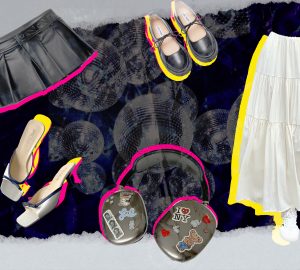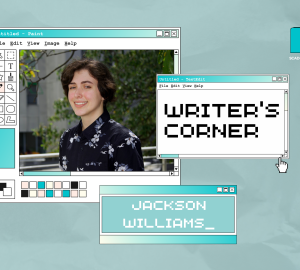Writer’s Corner: ‘On the Other Side of the Pond — part one’
The Writer’s Corner features poetry, essays, short stories, satire and various fiction and non-fiction from SCAD Atlanta students. To submit your own work for the Writer’s Corner, email features@scadconnector.com.

“On the Other Side of the Pond — part one” by Ana Carrow
Poppy’s breath comes fast, burning in her chest, as she races through the woods behind her house. She contemplates kicking off the dress flats her mother forced her to wear tonight — as if that would help her run faster — but then decides that any possible splinters aren’t worth the risk. Burrs catch on her frilly socks, branches scraping her elbows, and the chilly air seizes in her throat. Still, she can’t shake the footsteps trailing her, pounding their way through the underbrush, always at her heels.
“You’ve never been very fast, Poppy!” Hugo calls after her, his voice closer than she thought. She groans, her lungs close to bursting, and propels herself forward by a few more strides before collapsing into the bracken. Thorns and sticks poke into her sides, but the slick layer of sweat on her skin makes it so that she can barely feel anything else.
“You win,” she gasps, as Hugo appears between the trees, his cheeks redder than usual. He bends over, gripping his own knees for support as he heaves for air.
“No fair,” he says. “That wasn’t a win. You forfeited.”
Poppy lifts a limp arm up into the air. “Here. Tag me, then.”
Her friend rolls his eyes, and then reluctantly taps her wrist. “You’re it.”
“I don’t want to play anymore.”
Hugo slumps down next to Poppy on the ground, rubbing at a patch of dirt stained across the knee of his tweed trousers. “My mom’s going to kill me. You’re always getting me into trouble.”
Poppy sits up, mostly recovered now, and pushes her soaked fringe off her forehead. “You started it! This wasn’t my idea. You know how much I hate running.”
He grins, picking at the patch of grass next to him, slicing one blade into two. “Yeah, that’s why it’s so easy to catch you.”
She glares, plucks a burr from the hem of her dress, and throws it at him. He retaliates with an acorn, and soon, the two of them are engaged in a battle, missiles ranging from pebbles to pinecones.
“Wait!” Poppy says suddenly, and Hugo pauses, a small twig held out in front of him like a fencing sword. “Did you hear that?”
Skepticism flashes across his face. He narrows his eyes. “What?”
Poppy turns, tossing a mushroom to her right, past the overgrowth and down a slight slope. There’s a soft plink as the mushroom hits a stagnant body of water, sounding out in the quiet calm of the twilight woods. Curious, she hauls herself to her feet and clambers down the slope, expecting Hugo to follow her. Sure enough, his footsteps are once again trailing after her own, and then they’re both entrenched in the muddy banks of a pond.
“These are my brother’s shoes, Poppy!” Hugo protests, desperately trying to resist the suck of the mud around his ankles. “Now he’s going to kill me, too.”
“But look how pretty this is!” she says, waving her hands around. The pond’s surface glitters in the fading sunlight, which is just barely pulsing through the lush canopy of trees overhead. A duck glides across the water, with strange brown marks around its eyes — almost like a mask, or a pair of glasses. Poppy watches as the bird submerges its head underwater, tailfeathers wiggling in the air.
“I guess so,” Hugo says, squinting at his own reflection in the water. “I look so foggy.”
“It’s water, not a mirror. Of course you look foggy.” With a sly smile, Poppy draws her hand back, and then slaps the water in Hugo’s direction, displacing his reflection even further.
“Hey!” he says, wiping at his eyes with his sleeve. “I was being serious. My face seemed — I don’t know, different. Like I wasn’t myself. Come, look.”
She sighs, disbelieving, and steps up to the water’s edge. The reeds tickle her shoulders as she bends over, inspecting her face in the glassy surface. Even though she had just sent ripples across it a moment ago, the water now appears unnaturally still. For a second, Poppy can’t even find her own reflection; she has to search for it, and only then does she find her eyes, shining black instead of green.
She leans closer, entranced. “What —” she starts, before a wave of pond water surges up to drench her. Stumbling back, she shakes the water from her hair, blinking furiously at Hugo, who’s laughing.
She wades into the pond — waist-deep, not caring anymore about the state of her dress or her mother’s attachment to fancy shoes — and pushes against the water, sending a torrent towards her friend. He dodges it, ducking behind the reeds and cattails, kicking up a current as he goes. Poppy begins to march back to the bank, determined for revenge, but her sodden skirt weighs her down. Heels trapped in the sludge at the bottom of the pond, her footing fails her. Dragging, sinking, she reaches for the bank — for a tree limb, for Hugo — and then slips, tumbling under.
*
Deprived of air, her mind swirls for a brief instant as she tries to detach herself from the mud that seems intent on pulling her below. She yanks her feet free, losing her flats to the depths, and then thrusts herself upward, swimming towards what looks like bright light.
Her face breaks the surface, and the sharp breeze dries the wetness on her cheeks almost immediately. Shaking her head, she stands up and looks to Hugo, waiting to receive his teasing over her blunder. Except that Hugo is no longer standing among the reeds. He’s nowhere to be seen.
She looks around, noticing that the air feels thicker on her skin. A rush runs through the trees, like a sigh, before settling again. Stillness takes over, no crickets or frogs or birds serving as a distraction from the silence. In that moment, Poppy is alone.
Until the water next to her bursts apart in a stream of bubbles, and Hugo rises, sputtering for air. He stares at her, brown hair matted to his head in a tangle of wet curls, his clothes soaked. “How —?” he asks. “Where did you go?”
“What do you mean?” Poppy says, bewildered. She couldn’t have been underwater for longer than a few seconds. “I just tripped.”
“Tripped?” he asks, slogging out of the pond. “You disappeared! I thought you’d drowned!”
She climbs out after him, squeezing the water out of her long braid. “No, I didn’t. Are you telling me you jumped in after me?”
“Well, what was I supposed to do? If you died, your mom would kill me!”
“Not everyone’s trying to kill you, you know.”
He crosses his arms and huffs, water dripping in heavy rivulets from his now-deflated puff sleeves. “This isn’t funny.”
“I know,” Poppy agrees. “So stop trying to trick me.”
He scrutinizes her face, trying to decipher if she’s telling the truth or not. Then he glances down. “What happened to your shoes?”
She drops her head back with a sigh, noticing that the sun has set a little lower since their pond escapade. Pockets of sunshine still dapple the water’s surface, highlighting the glow of the orange and yellow leaves above, but the sky is a faint purple. In less than an hour, it’ll be dark.
“We should get back,” she says.
“Looking like this?” He sniffs his collar and grimaces. “I smell like algae.”
“Listen, I didn’t ask you to —” Poppy stops herself, distracted by another voice, but it isn’t Hugo’s. Someone is singing — a deep, throaty ballad, coming from a shroud of trees behind them.
Hugo’s eyebrows raise. “Who is that?” he whispers.
Poppy shrugs, and then heads off to investigate, ignoring Hugo as he calls after her. The singing grows louder, and rowdier, as Poppy edges closer. The tune is jaunty and fun, but she can’t quite make out the words. Crouching down behind a boulder, she beckons Hugo next to her. Shoulders pressed together, they both peek over the moss, and spot a pirate.
At least, he seems like a pirate to Poppy. With a long, scraggly beard and a skull cap tied around his head, the man is dressed in ballooning pants and an open white shirt, revealing a tanned chest. His faded leather boots have holes in the toes, and his fingers — strumming an out of tune mandolin — are adorned with rings, flashing in the light. He leans against an old, wooden dinghy, complete with a tattered black flag hanging from the mast. Each time the pirate opens his mouth to bellow out another note, Poppy counts another missing tooth.
In the middle of a verse, the pirate stops singing. “I see you, lassie,” he says, staring beyond the boulder. “And your friend, too.”
Hugo’s eyes go wide as Poppy stands, but he raises himself alongside her — after a reluctant pause. “Who are you?” she asks, as a duck waddles out of the brush, coming to squat next to the pirate. He sets aside his mandolin, stroking the duck’s head with brown knuckles. The unusual pattern around the duck’s eyes tells Poppy that it’s the same duck she spotted earlier.
“I’m a sailor,” the pirate says, pulling some crumbs out of his shirt pocket and sprinkling them near his feet. The duck chases after the food, its beak prodding the dirt. “A rogue, some call me.”
“So, a pirate?” Poppy suggests.
“Assumptions — always with the assumptions,” the pirate grumbles to himself. “I’m no freeloader. These waters are mine, fair and square.”
“What waters?” Hugo asks. “Are you talking about the pond?”
“Aye, she’s mine. You have a problem with my pond?”
Hugo crosses his arms, unamused. “Is this a stunt for, like, Halloween?”
The pirate makes a face. “Eh? What’s that, son?”
“Nevermind,” Hugo says, shaking his head. To Poppy, he whispers, “Let’s go. This guy is obviously a wackjob.”
“Not so fast, there,” the pirate says, lifting himself to his feet. Poppy estimates him to be a good foot and a half taller than either her or Hugo, who cringes at the pirate’s looming presence. “Like I said, I own these waters. You both owe me a fare for traveling across.”
“A fare?” Hugo says, but Poppy lays a hand on his arm, silencing him. She steps forward, digging into her skirt pocket for something of value. Her fingers grasp a bit of quartz she’d found that morning, while she and Hugo had been clearing worms from the road after last night’s rain.
“Will this do?” she asks, offering the rock.
The pirate takes it from her, holding it up to his eye, too close to actually see anything in detail. He bites down on it, and then nods. “Some sparkling stone. Very nice. And you?” he asks, turning to Hugo.
Hugo blanches, and then reaches for the first thing in his pocket. Drawing out a nickel, he practically throws it into the pirate’s palm.
“A portrait of a tiny man,” the pirate comments, seeming pleased. He tosses both of the tokens into his dinghy, brushing his hands together. “How strange you humans are.”
Hugo shoots Poppy a concerned look, but she waves him off. Another rush whistles through the branches above them, sending the dead leaves fluttering down in a too-perfect spiral. The sound reminds Poppy of a chorus of whispers, even though she knows it’s probably just the wind.
The duck quacks, rumpling its feathers as it pecks at the pirate’s worn boots.
“Aw, shush, Henny,” he says, crouching down to pat the duck’s head. “But she’s right,” he says, glancing back up at Poppy and Hugo. “I’d recommend you both getting out of here before dark. The trees are already spreading the news.”
“The trees?” Poppy asks, but Hugo tugs on her arm.
“Yes, we really should be going,” he insists, through a clenched jaw. “We have to get home, before our families start to worry.”
























